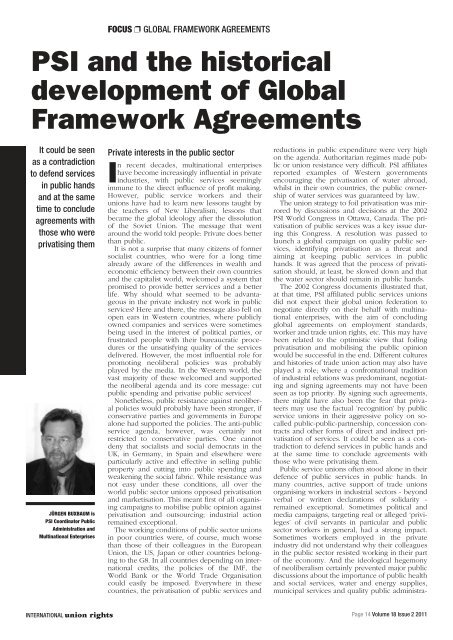FOCUS ❐ GLOBAL FRAMEWORK AGREEMENTSPSI and the historicaldevelopment of <strong>Global</strong><strong>Framework</strong> <strong>Agreements</strong>It could be seenas a contradictionto defend servicesin public handsand at the sametime to concludeagreements withthose who wereprivatising themJÜRGEN BUXBAUM isPSI Coordinator PublicAdministration andMultinational EnterprisesPrivate interests in the public sectorIn recent decades, multinational enterpriseshave become increasingly influential in privateindustries, with public services seeminglyimmune to the direct influence of profit making.However, public service workers and theirunions have had to learn new lessons taught bythe teachers of New Liberalism, lessons thatbecame the global ideology after the dissolutionof the Soviet Union. The message that wentaround the world told people: Private does betterthan public.It is not a surprise that many citizens of <strong>for</strong>mersocialist countries, who were <strong>for</strong> a long timealready aware of the differences in wealth andeconomic efficiency between their own countriesand the capitalist world, welcomed a system thatpromised to provide better services and a betterlife. Why should what seemed to be advantageousin the private industry not work in publicservices? Here and there, the message also fell onopen ears in Western countries, where publiclyowned companies and services were sometimesbeing used in the interest of political parties, orfrustrated people with their bureaucratic proceduresor the unsatisfying quality of the servicesdelivered. However, the most influential role <strong>for</strong>promoting neoliberal policies was probablyplayed by the media. In the Western world, thevast majority of these welcomed and supportedthe neoliberal agenda and its core message: cutpublic spending and privatise public services!Nonetheless, public resistance against neoliberalpolicies would probably have been stronger, ifconservative parties and governments in Europealone had supported the policies. The anti-publicservice agenda, however, was certainly notrestricted to conservative parties. One cannotdeny that socialists and social democrats in theUK, in Germany, in Spain and elsewhere wereparticularly active and effective in selling publicproperty and cutting into public spending andweakening the social fabric. While resistance wasnot easy under these conditions, all over theworld public sector unions opposed privatisationand marketisation. This meant first of all organisingcampaigns to mobilise public opinion againstprivatisation and outsourcing; industrial actionremained exceptional.The working conditions of public sector unionsin poor countries were, of course, much worsethan those of their colleagues in the EuropeanUnion, the US, Japan or other countries belongingto the G8. In all countries depending on internationalcredits, the policies of the IMF, theWorld Bank or the World <strong>Trade</strong> Organisationcould easily be imposed. Everywhere in thesecountries, the privatisation of public services andreductions in public expenditure were very highon the agenda. Authoritarian regimes made publicor union resistance very difficult. PSI affiliatesreported examples of Western governmentsencouraging the privatisation of water abroad,whilst in their own countries, the public ownershipof water services was guaranteed by law.The union strategy to foil privatisation was mirroredby discussions and decisions at the 2002PSI World Congress in Ottawa, Canada. The privatisationof public services was a key issue duringthis Congress. A resolution was passed tolaunch a global campaign on quality public services,identifying privatisation as a threat andaiming at keeping public services in publichands. It was agreed that the process of privatisationshould, at least, be slowed down and thatthe water sector should remain in public hands.The 2002 Congress documents illustrated that,at that time, PSI affiliated public services unionsdid not expect their global union federation tonegotiate directly on their behalf with multinationalenterprises, with the aim of concludingglobal agreements on employment standards,worker and trade union rights, etc. This may havebeen related to the optimistic view that foilingprivatisation and mobilising the public opinionwould be successful in the end. Different culturesand histories of trade union action may also haveplayed a role; where a confrontational traditionof industrial relations was predominant, negotiatingand signing agreements may not have beenseen as top priority. By signing such agreements,there might have also been the fear that privateersmay use the factual ‘recognition’ by publicservice unions in their aggressive policy on socalledpublic-public-partnership, concession contractsand other <strong>for</strong>ms of direct and indirect privatisationof services. It could be seen as a contradictionto defend services in public hands andat the same time to conclude agreements withthose who were privatising them.Public service unions often stood alone in theirdefence of public services in public hands. Inmany countries, active support of trade unionsorganising workers in industrial sectors - beyondverbal or written declarations of solidarity -remained exceptional. Sometimes political andmedia campaigns, targeting real or alleged ‘privileges’of civil servants in particular and publicsector workers in general, had a strong impact.Sometimes workers employed in the privateindustry did not understand why their colleaguesin the public sector resisted working in their partof the economy. And the ideological hegemonyof neoliberalism certainly prevented major publicdiscussions about the importance of public healthand social services, water and energy supplies,municipal services and quality public administra-INTERNATIONAL union rights Page 14 Volume 18 Issue 2 2011
FOCUS ❐ GLOBAL FRAMEWORK AGREEMENTStion <strong>for</strong> the well being of societies as a whole.In innumerable cases, public sector unionswere unable to prevent services from being privatised.Very often, more and more private companies,acting over a whole continent or worldwide,took over the control of water supply andhealth care facilities, prisons and correctional services,public transport and education, energyproduction and distribution, security services andeven tax administration.PSI and global framework agreementsA productive discussion about the pros and consof global agreements with MNEs is still on-goingin PSI, but two things determining PSI policieshave changed.Recently, the number of public sector unionmembers working in services run by privatecompanies has increased significantly, althoughdiffering quite a lot from country to country orfrom union to union. Unions followed - or hadto follow - their members into the private sector.When the private employers were multinationalcompanies, workers were under threat by unfaircompetition within the enterprise and by socialdumping. <strong>Global</strong>isation under neoliberal conditions<strong>for</strong>ced not only countries, but also workersin global companies, into a ‘race to the bottom’.This is why an increasing number of publicsector unions began demanding their<strong>International</strong> put multinational enterprises muchhigher on their agenda. However, it stillremained an exception that in January 2005 PSI,together with many national and internationaltrade union organisations, signed its first globalagreement with the French multinational energycompany EDF.The second important development <strong>for</strong> changingconditions of public sector unions’ and PSI’spolicy is the significantly increased public awarenessand the recognition among unions of theprivate sector that quality public services are vital<strong>for</strong> equal chances in society, economic wealthand social justice, even <strong>for</strong> democracy and thelife expectancy of citizens. The experience of theglobal financial and economic crisis certainlycontributed to public consciousness that neoliberalpolicies are the problem and not the solution.This new awareness culminated in the majorglobal conference on quality public services inOctober 2010 in Geneva, the first joint eventorganised by the Council of <strong>Global</strong> Unions,which unites the <strong>International</strong> <strong>Trade</strong> UnionConfederation and all <strong>Global</strong> Union Federationsthat represent the unions from all sectors of society.The conference adopted the Geneva Charteron Quality Public Services and agreed on a jointaction programme to fight <strong>for</strong> and defend qualityservices in public hands. It goes without sayingthat PSI did not and does not change its policy ofadhering to the principle that services fundamentalto society must be in public ownership. But atthe same time, the last PSI Congress in 2007 inVienna adopted a new policy on multinationalcorporations, recognising that the <strong>International</strong>and its affiliates need to deal with MNEs wherethey appear in the public sector. Congress resolutionPSI <strong>Global</strong> Policy and Strategic Objectives2008 – 2012 mentions activities related to MNEs,including monitoring their activities, developingnetworks and organising workers within MNEs,lobbying <strong>for</strong> improved regulation of MNEs,denouncing violations of trade rights, etc.Negotiating with multinational enterprises andsigning global agreements are declared explicitlyto be strategic objectives of the organisation.In 2009, PSI commenced negotiations with theFrench multinational corporation GDF SUEZ. Thecompany employs more than 200,000 workersworldwide, and its operations concentrate on theenergy, water, gas, infrastructure and environmentsectors. Negotiations were carried out jointlywith PSI’s sister organisations, the Building andWood Worker’s <strong>International</strong> (BWI) and the<strong>International</strong> Federation of Chemical, Energy,Mine and General Workers’ Unions (ICEM),which both have affiliated unions organisingworkers in subsidiaries of GDF SUEZ.Successful negotiations were concluded on anagreement that many see as a model <strong>for</strong> othercompanies and GUFs. Key features of the agreementinclude:■ applies to all present and future GDF SUEZcompanies, employees, subcontractors andsuppliers, and it commits the company torespect the rights and dignity of people underall circumstances and to a zero tolerance policyon fraud and corruption.■ recognition of major international standards,e.g.Universal Declaration of Human Rights,the OECD Guidelines and the ILO Declarationon Multinational Enterprises, the ILODeclaration on Fundamental Rights at Work,guarantee of equal treatment of all employeesregardless of age, origin, nationality, religion,culture, sexual or political orientation.■ respects the rights of employees to <strong>for</strong>m orjoin trade unions with no discriminationagainst these workers or trade union or otherworkers’ representatives. Access of tradeunion representatives to the employees willbe facilitated by the company and it will providein<strong>for</strong>mation on its operations to tradeunions to facilitate collective bargaining.■ Preference shall be given <strong>for</strong> permanent,open-ended and direct employment, noexcessive use will be made of temporary oragency labour, and bogus self-employmentwill not be applied.■ GDF SUEZ and all subcontractors shall paysocial security and pension contributions <strong>for</strong>their workers where such provisions exist.Best occupational health and safety practiceshall be promoted.■ The company shall endeavour to preservenatural resources and protect biodiversity.The parties to the agreement expressed theirintention to conclude follow-up agreements onmore specific fields of application, such asrestructuring, occupational health and safety,training, sustainable development and climatechange. The agreement includes specific chapterson implementation, monitoring, control andreporting and conflict resolution.The agreement was signed in November 2010.PSI will continue and en<strong>for</strong>ce its policies to concludeagreements with other multinational corporationssetting up networks of unions and workersin multinational enterprises.The last PSICongress in 2007in Vienna adopteda new policy onmultinationalcorporations,recognising thatthe <strong>International</strong>and its affiliatesneed to deal withMNEs where theyappear in thepublic sectorPage 15 Volume 18 Issue 2 2011INTERNATIONAL union rights





